Analysis of Vygotsky's Socio-Cultural Theory in Child Development
VerifiedAdded on 2022/09/07
|8
|1512
|32
Report
AI Summary
This report provides a detailed analysis of Lev Vygotsky's socio-cultural theory of child development. It begins with an introduction to the theory, emphasizing the importance of social interaction and the environment in cognitive development. The report then defines and critically analyzes key concepts such as the zone of proximal development (ZPD), scaffolding, mediation, private speech, and internalization. It explores the advantages of Vygotsky's theory, including its focus on personalized and engaging education, while also addressing its disadvantages, such as its potential vagueness and limited consideration of cultural differences. Furthermore, the report discusses the implications of Vygotsky's theory for teaching and learning, particularly the use of ZPD to guide instruction. The report concludes by highlighting the significance of Vygotsky's theory in various fields like linguistics, education, and psychology, emphasizing its contribution to a more systematic and effective approach to child development and learning. The report is a student submission to Desklib, a platform offering AI-powered study tools.
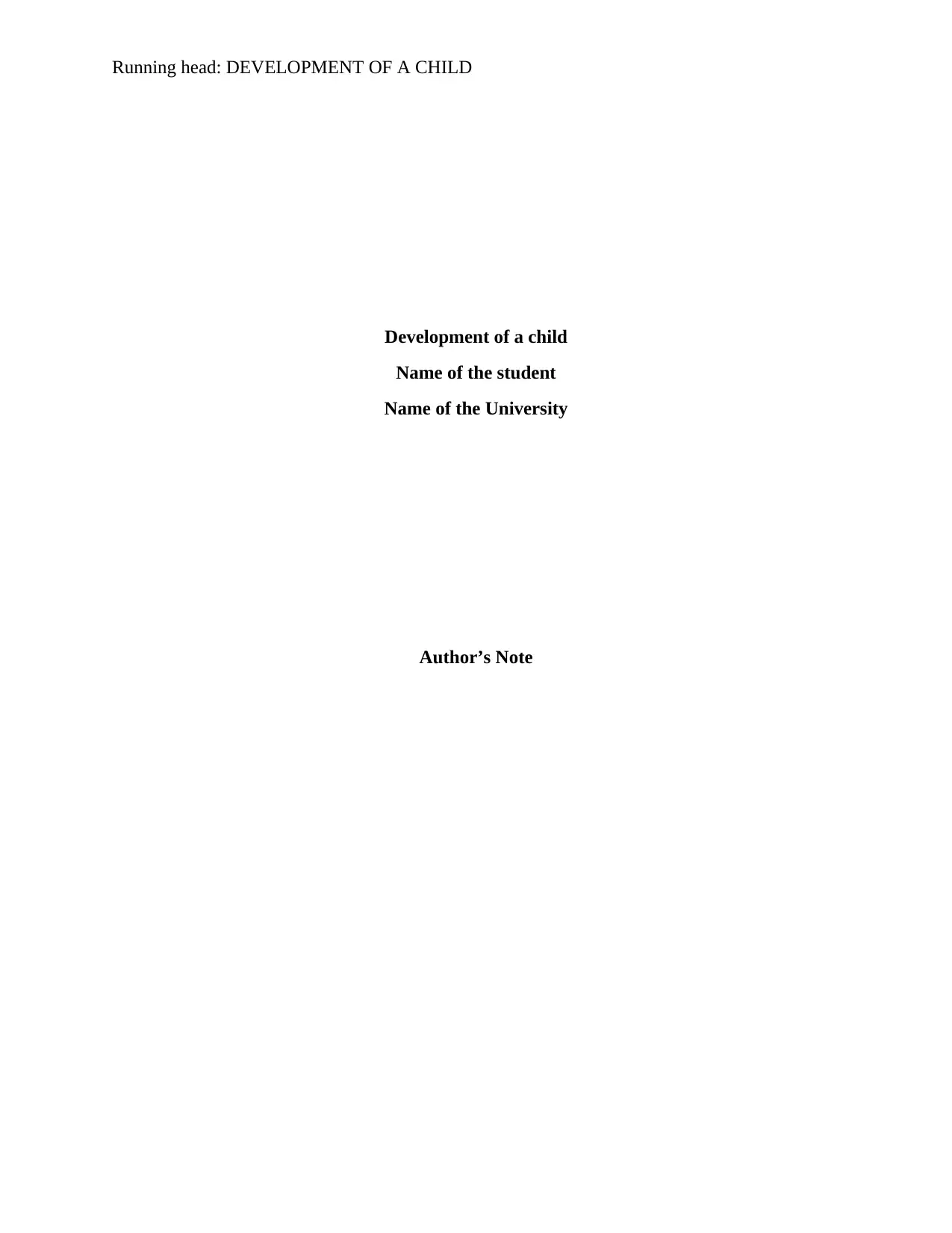
Running head: DEVELOPMENT OF A CHILD
Development of a child
Name of the student
Name of the University
Author’s Note
Development of a child
Name of the student
Name of the University
Author’s Note
Paraphrase This Document
Need a fresh take? Get an instant paraphrase of this document with our AI Paraphraser
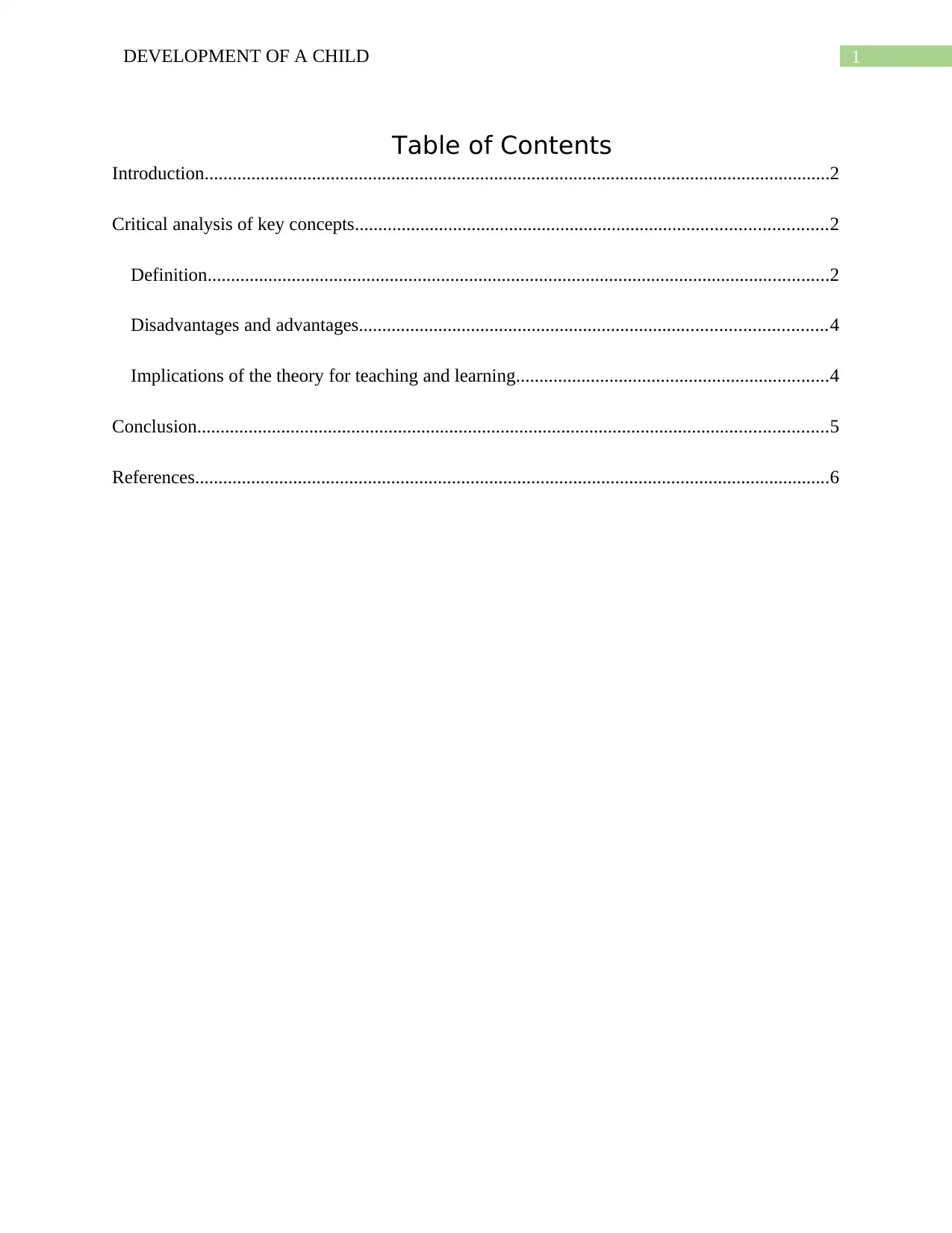
1DEVELOPMENT OF A CHILD
Table of Contents
Introduction......................................................................................................................................2
Critical analysis of key concepts.....................................................................................................2
Definition.....................................................................................................................................2
Disadvantages and advantages....................................................................................................4
Implications of the theory for teaching and learning...................................................................4
Conclusion.......................................................................................................................................5
References........................................................................................................................................6
Table of Contents
Introduction......................................................................................................................................2
Critical analysis of key concepts.....................................................................................................2
Definition.....................................................................................................................................2
Disadvantages and advantages....................................................................................................4
Implications of the theory for teaching and learning...................................................................4
Conclusion.......................................................................................................................................5
References........................................................................................................................................6
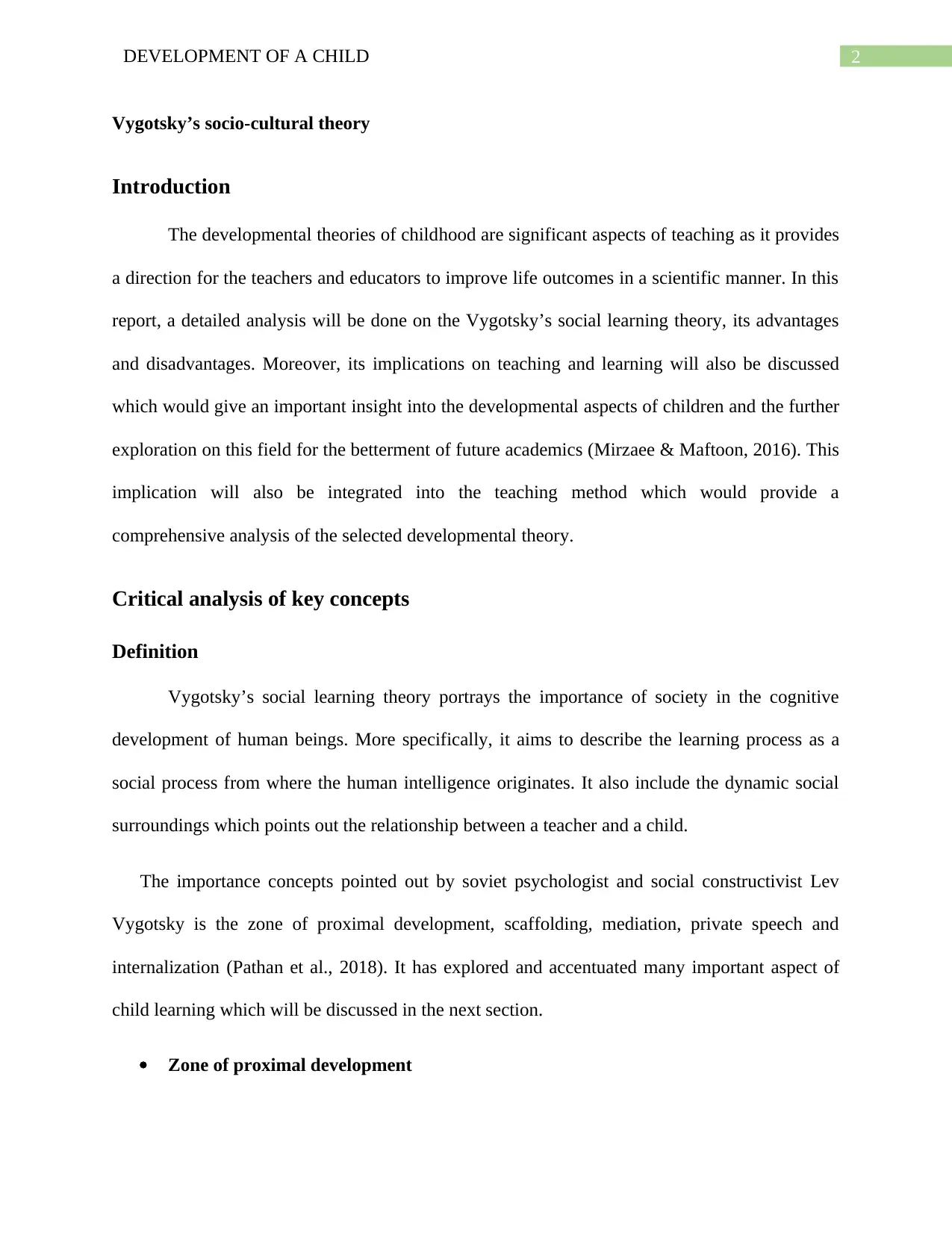
2DEVELOPMENT OF A CHILD
Vygotsky’s socio-cultural theory
Introduction
The developmental theories of childhood are significant aspects of teaching as it provides
a direction for the teachers and educators to improve life outcomes in a scientific manner. In this
report, a detailed analysis will be done on the Vygotsky’s social learning theory, its advantages
and disadvantages. Moreover, its implications on teaching and learning will also be discussed
which would give an important insight into the developmental aspects of children and the further
exploration on this field for the betterment of future academics (Mirzaee & Maftoon, 2016). This
implication will also be integrated into the teaching method which would provide a
comprehensive analysis of the selected developmental theory.
Critical analysis of key concepts
Definition
Vygotsky’s social learning theory portrays the importance of society in the cognitive
development of human beings. More specifically, it aims to describe the learning process as a
social process from where the human intelligence originates. It also include the dynamic social
surroundings which points out the relationship between a teacher and a child.
The importance concepts pointed out by soviet psychologist and social constructivist Lev
Vygotsky is the zone of proximal development, scaffolding, mediation, private speech and
internalization (Pathan et al., 2018). It has explored and accentuated many important aspect of
child learning which will be discussed in the next section.
Zone of proximal development
Vygotsky’s socio-cultural theory
Introduction
The developmental theories of childhood are significant aspects of teaching as it provides
a direction for the teachers and educators to improve life outcomes in a scientific manner. In this
report, a detailed analysis will be done on the Vygotsky’s social learning theory, its advantages
and disadvantages. Moreover, its implications on teaching and learning will also be discussed
which would give an important insight into the developmental aspects of children and the further
exploration on this field for the betterment of future academics (Mirzaee & Maftoon, 2016). This
implication will also be integrated into the teaching method which would provide a
comprehensive analysis of the selected developmental theory.
Critical analysis of key concepts
Definition
Vygotsky’s social learning theory portrays the importance of society in the cognitive
development of human beings. More specifically, it aims to describe the learning process as a
social process from where the human intelligence originates. It also include the dynamic social
surroundings which points out the relationship between a teacher and a child.
The importance concepts pointed out by soviet psychologist and social constructivist Lev
Vygotsky is the zone of proximal development, scaffolding, mediation, private speech and
internalization (Pathan et al., 2018). It has explored and accentuated many important aspect of
child learning which will be discussed in the next section.
Zone of proximal development
⊘ This is a preview!⊘
Do you want full access?
Subscribe today to unlock all pages.

Trusted by 1+ million students worldwide
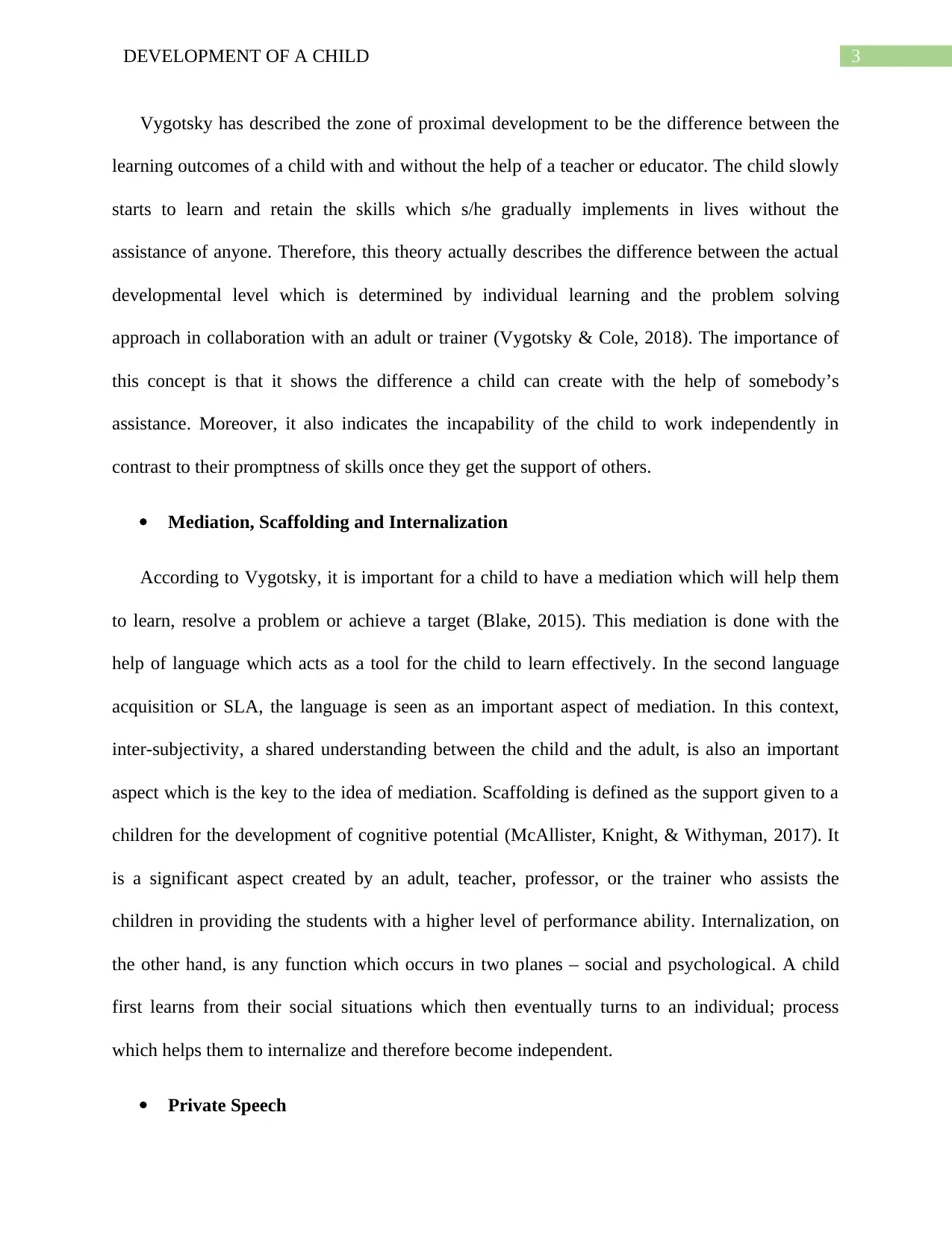
3DEVELOPMENT OF A CHILD
Vygotsky has described the zone of proximal development to be the difference between the
learning outcomes of a child with and without the help of a teacher or educator. The child slowly
starts to learn and retain the skills which s/he gradually implements in lives without the
assistance of anyone. Therefore, this theory actually describes the difference between the actual
developmental level which is determined by individual learning and the problem solving
approach in collaboration with an adult or trainer (Vygotsky & Cole, 2018). The importance of
this concept is that it shows the difference a child can create with the help of somebody’s
assistance. Moreover, it also indicates the incapability of the child to work independently in
contrast to their promptness of skills once they get the support of others.
Mediation, Scaffolding and Internalization
According to Vygotsky, it is important for a child to have a mediation which will help them
to learn, resolve a problem or achieve a target (Blake, 2015). This mediation is done with the
help of language which acts as a tool for the child to learn effectively. In the second language
acquisition or SLA, the language is seen as an important aspect of mediation. In this context,
inter-subjectivity, a shared understanding between the child and the adult, is also an important
aspect which is the key to the idea of mediation. Scaffolding is defined as the support given to a
children for the development of cognitive potential (McAllister, Knight, & Withyman, 2017). It
is a significant aspect created by an adult, teacher, professor, or the trainer who assists the
children in providing the students with a higher level of performance ability. Internalization, on
the other hand, is any function which occurs in two planes – social and psychological. A child
first learns from their social situations which then eventually turns to an individual; process
which helps them to internalize and therefore become independent.
Private Speech
Vygotsky has described the zone of proximal development to be the difference between the
learning outcomes of a child with and without the help of a teacher or educator. The child slowly
starts to learn and retain the skills which s/he gradually implements in lives without the
assistance of anyone. Therefore, this theory actually describes the difference between the actual
developmental level which is determined by individual learning and the problem solving
approach in collaboration with an adult or trainer (Vygotsky & Cole, 2018). The importance of
this concept is that it shows the difference a child can create with the help of somebody’s
assistance. Moreover, it also indicates the incapability of the child to work independently in
contrast to their promptness of skills once they get the support of others.
Mediation, Scaffolding and Internalization
According to Vygotsky, it is important for a child to have a mediation which will help them
to learn, resolve a problem or achieve a target (Blake, 2015). This mediation is done with the
help of language which acts as a tool for the child to learn effectively. In the second language
acquisition or SLA, the language is seen as an important aspect of mediation. In this context,
inter-subjectivity, a shared understanding between the child and the adult, is also an important
aspect which is the key to the idea of mediation. Scaffolding is defined as the support given to a
children for the development of cognitive potential (McAllister, Knight, & Withyman, 2017). It
is a significant aspect created by an adult, teacher, professor, or the trainer who assists the
children in providing the students with a higher level of performance ability. Internalization, on
the other hand, is any function which occurs in two planes – social and psychological. A child
first learns from their social situations which then eventually turns to an individual; process
which helps them to internalize and therefore become independent.
Private Speech
Paraphrase This Document
Need a fresh take? Get an instant paraphrase of this document with our AI Paraphraser
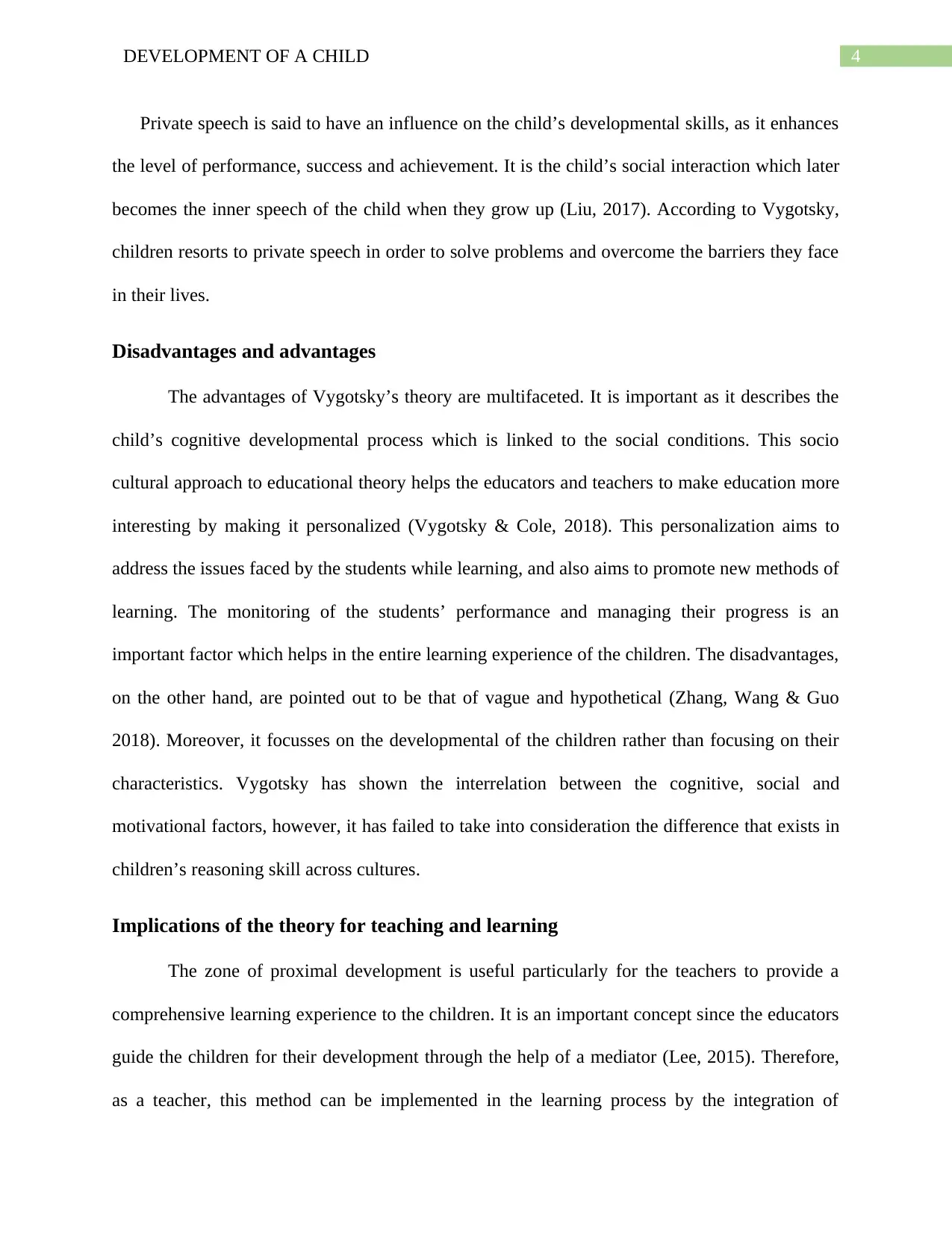
4DEVELOPMENT OF A CHILD
Private speech is said to have an influence on the child’s developmental skills, as it enhances
the level of performance, success and achievement. It is the child’s social interaction which later
becomes the inner speech of the child when they grow up (Liu, 2017). According to Vygotsky,
children resorts to private speech in order to solve problems and overcome the barriers they face
in their lives.
Disadvantages and advantages
The advantages of Vygotsky’s theory are multifaceted. It is important as it describes the
child’s cognitive developmental process which is linked to the social conditions. This socio
cultural approach to educational theory helps the educators and teachers to make education more
interesting by making it personalized (Vygotsky & Cole, 2018). This personalization aims to
address the issues faced by the students while learning, and also aims to promote new methods of
learning. The monitoring of the students’ performance and managing their progress is an
important factor which helps in the entire learning experience of the children. The disadvantages,
on the other hand, are pointed out to be that of vague and hypothetical (Zhang, Wang & Guo
2018). Moreover, it focusses on the developmental of the children rather than focusing on their
characteristics. Vygotsky has shown the interrelation between the cognitive, social and
motivational factors, however, it has failed to take into consideration the difference that exists in
children’s reasoning skill across cultures.
Implications of the theory for teaching and learning
The zone of proximal development is useful particularly for the teachers to provide a
comprehensive learning experience to the children. It is an important concept since the educators
guide the children for their development through the help of a mediator (Lee, 2015). Therefore,
as a teacher, this method can be implemented in the learning process by the integration of
Private speech is said to have an influence on the child’s developmental skills, as it enhances
the level of performance, success and achievement. It is the child’s social interaction which later
becomes the inner speech of the child when they grow up (Liu, 2017). According to Vygotsky,
children resorts to private speech in order to solve problems and overcome the barriers they face
in their lives.
Disadvantages and advantages
The advantages of Vygotsky’s theory are multifaceted. It is important as it describes the
child’s cognitive developmental process which is linked to the social conditions. This socio
cultural approach to educational theory helps the educators and teachers to make education more
interesting by making it personalized (Vygotsky & Cole, 2018). This personalization aims to
address the issues faced by the students while learning, and also aims to promote new methods of
learning. The monitoring of the students’ performance and managing their progress is an
important factor which helps in the entire learning experience of the children. The disadvantages,
on the other hand, are pointed out to be that of vague and hypothetical (Zhang, Wang & Guo
2018). Moreover, it focusses on the developmental of the children rather than focusing on their
characteristics. Vygotsky has shown the interrelation between the cognitive, social and
motivational factors, however, it has failed to take into consideration the difference that exists in
children’s reasoning skill across cultures.
Implications of the theory for teaching and learning
The zone of proximal development is useful particularly for the teachers to provide a
comprehensive learning experience to the children. It is an important concept since the educators
guide the children for their development through the help of a mediator (Lee, 2015). Therefore,
as a teacher, this method can be implemented in the learning process by the integration of
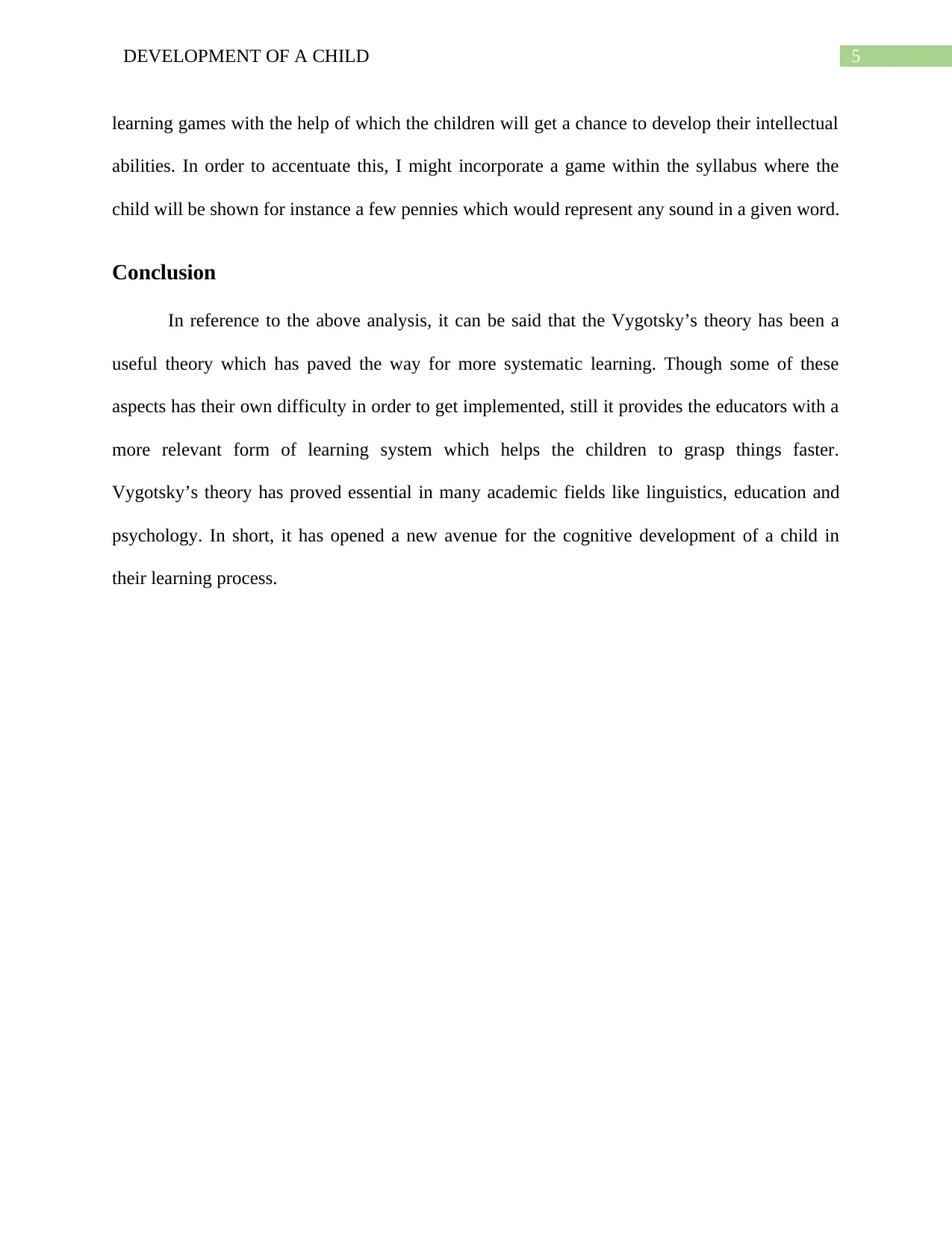
5DEVELOPMENT OF A CHILD
learning games with the help of which the children will get a chance to develop their intellectual
abilities. In order to accentuate this, I might incorporate a game within the syllabus where the
child will be shown for instance a few pennies which would represent any sound in a given word.
Conclusion
In reference to the above analysis, it can be said that the Vygotsky’s theory has been a
useful theory which has paved the way for more systematic learning. Though some of these
aspects has their own difficulty in order to get implemented, still it provides the educators with a
more relevant form of learning system which helps the children to grasp things faster.
Vygotsky’s theory has proved essential in many academic fields like linguistics, education and
psychology. In short, it has opened a new avenue for the cognitive development of a child in
their learning process.
learning games with the help of which the children will get a chance to develop their intellectual
abilities. In order to accentuate this, I might incorporate a game within the syllabus where the
child will be shown for instance a few pennies which would represent any sound in a given word.
Conclusion
In reference to the above analysis, it can be said that the Vygotsky’s theory has been a
useful theory which has paved the way for more systematic learning. Though some of these
aspects has their own difficulty in order to get implemented, still it provides the educators with a
more relevant form of learning system which helps the children to grasp things faster.
Vygotsky’s theory has proved essential in many academic fields like linguistics, education and
psychology. In short, it has opened a new avenue for the cognitive development of a child in
their learning process.
⊘ This is a preview!⊘
Do you want full access?
Subscribe today to unlock all pages.

Trusted by 1+ million students worldwide
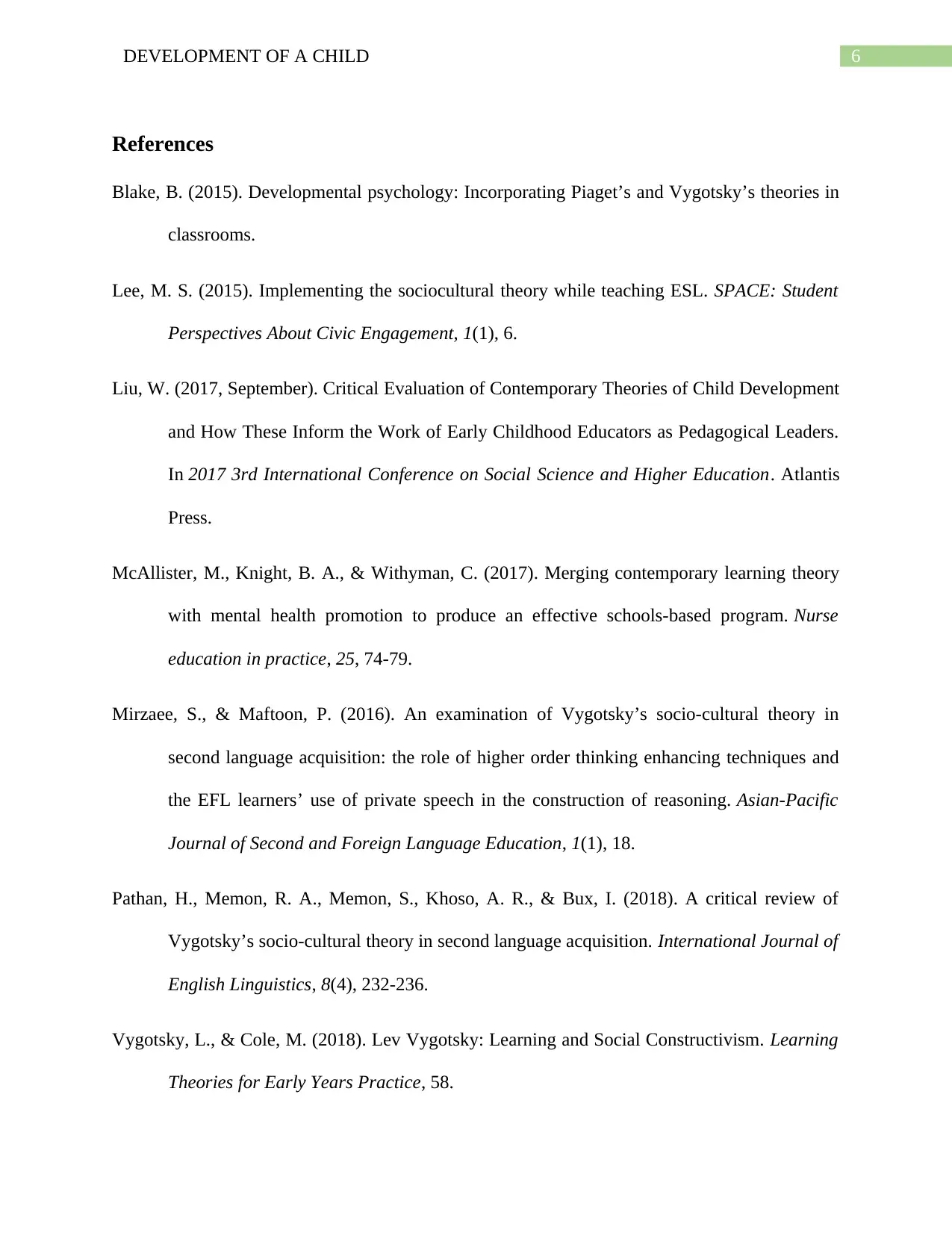
6DEVELOPMENT OF A CHILD
References
Blake, B. (2015). Developmental psychology: Incorporating Piaget’s and Vygotsky’s theories in
classrooms.
Lee, M. S. (2015). Implementing the sociocultural theory while teaching ESL. SPACE: Student
Perspectives About Civic Engagement, 1(1), 6.
Liu, W. (2017, September). Critical Evaluation of Contemporary Theories of Child Development
and How These Inform the Work of Early Childhood Educators as Pedagogical Leaders.
In 2017 3rd International Conference on Social Science and Higher Education. Atlantis
Press.
McAllister, M., Knight, B. A., & Withyman, C. (2017). Merging contemporary learning theory
with mental health promotion to produce an effective schools-based program. Nurse
education in practice, 25, 74-79.
Mirzaee, S., & Maftoon, P. (2016). An examination of Vygotsky’s socio-cultural theory in
second language acquisition: the role of higher order thinking enhancing techniques and
the EFL learners’ use of private speech in the construction of reasoning. Asian-Pacific
Journal of Second and Foreign Language Education, 1(1), 18.
Pathan, H., Memon, R. A., Memon, S., Khoso, A. R., & Bux, I. (2018). A critical review of
Vygotsky’s socio-cultural theory in second language acquisition. International Journal of
English Linguistics, 8(4), 232-236.
Vygotsky, L., & Cole, M. (2018). Lev Vygotsky: Learning and Social Constructivism. Learning
Theories for Early Years Practice, 58.
References
Blake, B. (2015). Developmental psychology: Incorporating Piaget’s and Vygotsky’s theories in
classrooms.
Lee, M. S. (2015). Implementing the sociocultural theory while teaching ESL. SPACE: Student
Perspectives About Civic Engagement, 1(1), 6.
Liu, W. (2017, September). Critical Evaluation of Contemporary Theories of Child Development
and How These Inform the Work of Early Childhood Educators as Pedagogical Leaders.
In 2017 3rd International Conference on Social Science and Higher Education. Atlantis
Press.
McAllister, M., Knight, B. A., & Withyman, C. (2017). Merging contemporary learning theory
with mental health promotion to produce an effective schools-based program. Nurse
education in practice, 25, 74-79.
Mirzaee, S., & Maftoon, P. (2016). An examination of Vygotsky’s socio-cultural theory in
second language acquisition: the role of higher order thinking enhancing techniques and
the EFL learners’ use of private speech in the construction of reasoning. Asian-Pacific
Journal of Second and Foreign Language Education, 1(1), 18.
Pathan, H., Memon, R. A., Memon, S., Khoso, A. R., & Bux, I. (2018). A critical review of
Vygotsky’s socio-cultural theory in second language acquisition. International Journal of
English Linguistics, 8(4), 232-236.
Vygotsky, L., & Cole, M. (2018). Lev Vygotsky: Learning and Social Constructivism. Learning
Theories for Early Years Practice, 58.
Paraphrase This Document
Need a fresh take? Get an instant paraphrase of this document with our AI Paraphraser
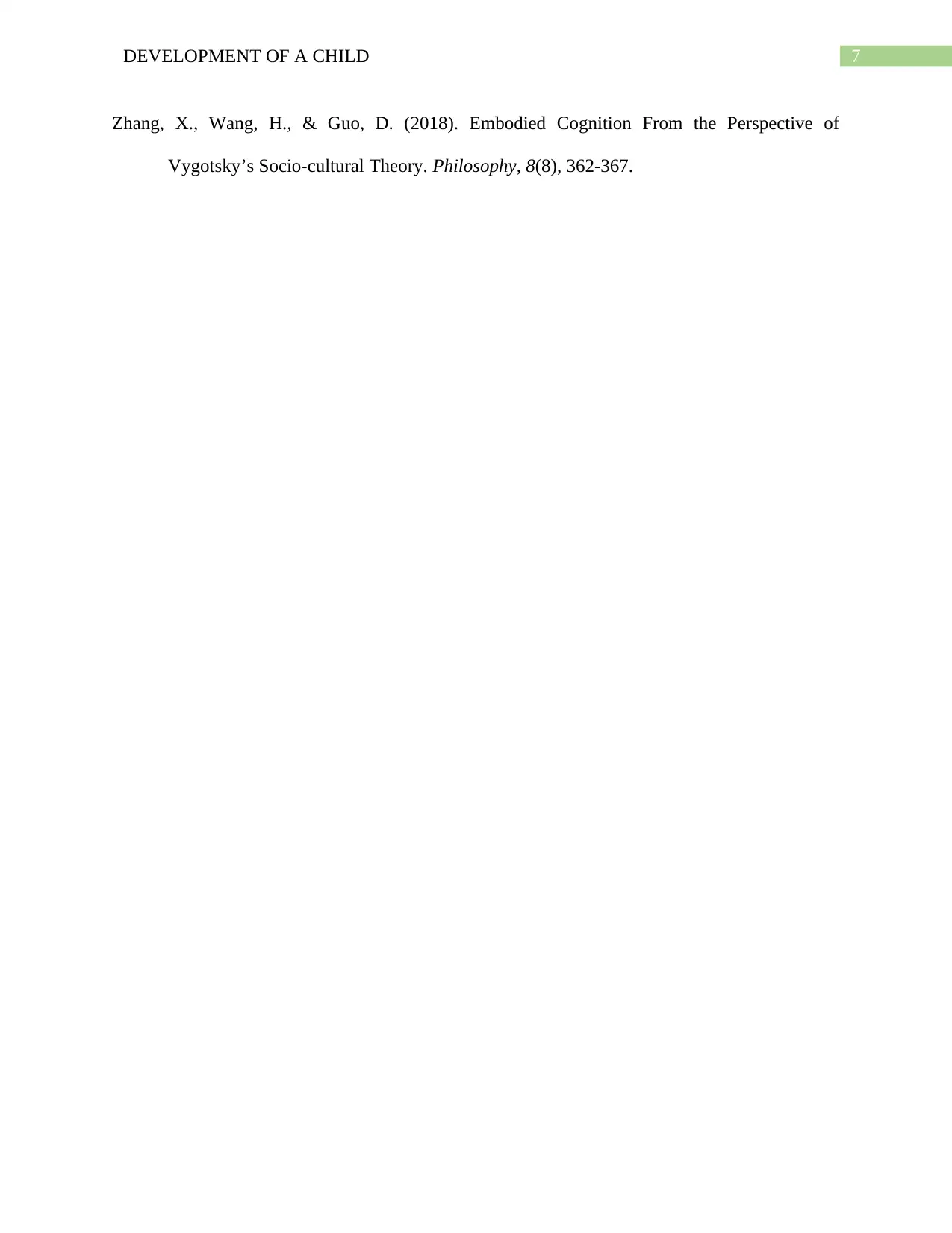
7DEVELOPMENT OF A CHILD
Zhang, X., Wang, H., & Guo, D. (2018). Embodied Cognition From the Perspective of
Vygotsky’s Socio-cultural Theory. Philosophy, 8(8), 362-367.
Zhang, X., Wang, H., & Guo, D. (2018). Embodied Cognition From the Perspective of
Vygotsky’s Socio-cultural Theory. Philosophy, 8(8), 362-367.
1 out of 8
Related Documents
Your All-in-One AI-Powered Toolkit for Academic Success.
+13062052269
info@desklib.com
Available 24*7 on WhatsApp / Email
![[object Object]](/_next/static/media/star-bottom.7253800d.svg)
Unlock your academic potential
Copyright © 2020–2026 A2Z Services. All Rights Reserved. Developed and managed by ZUCOL.





